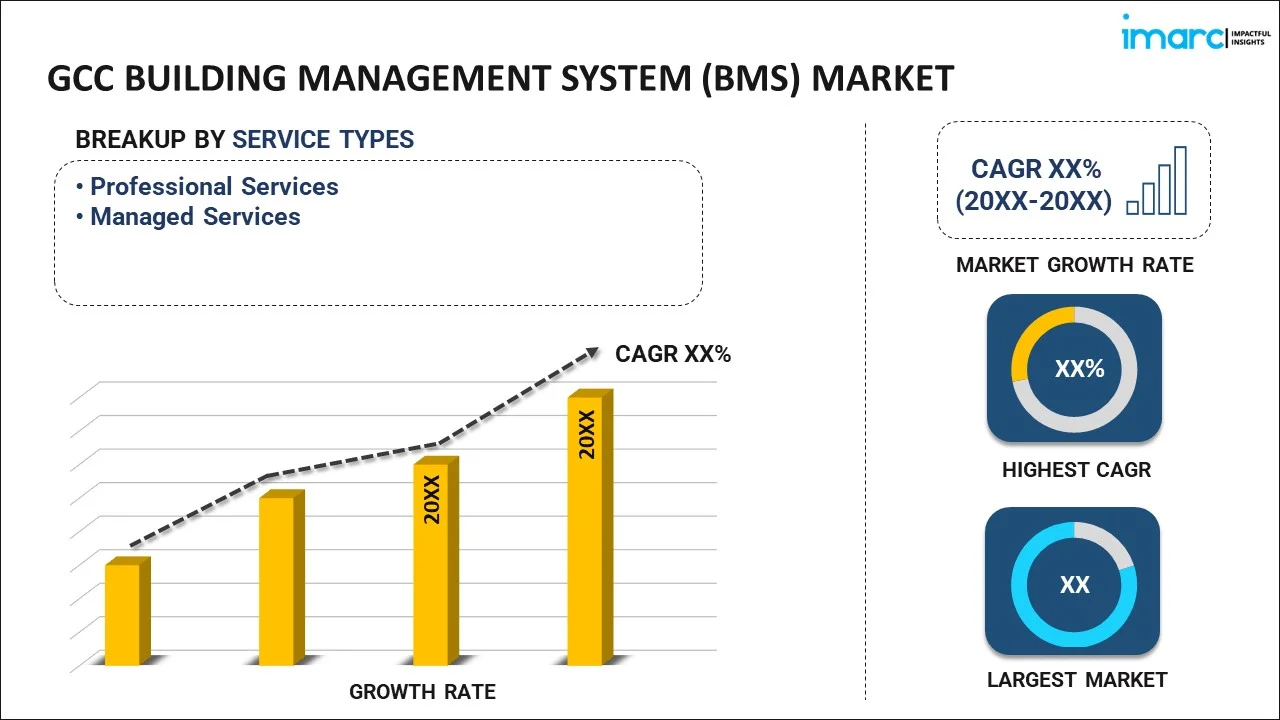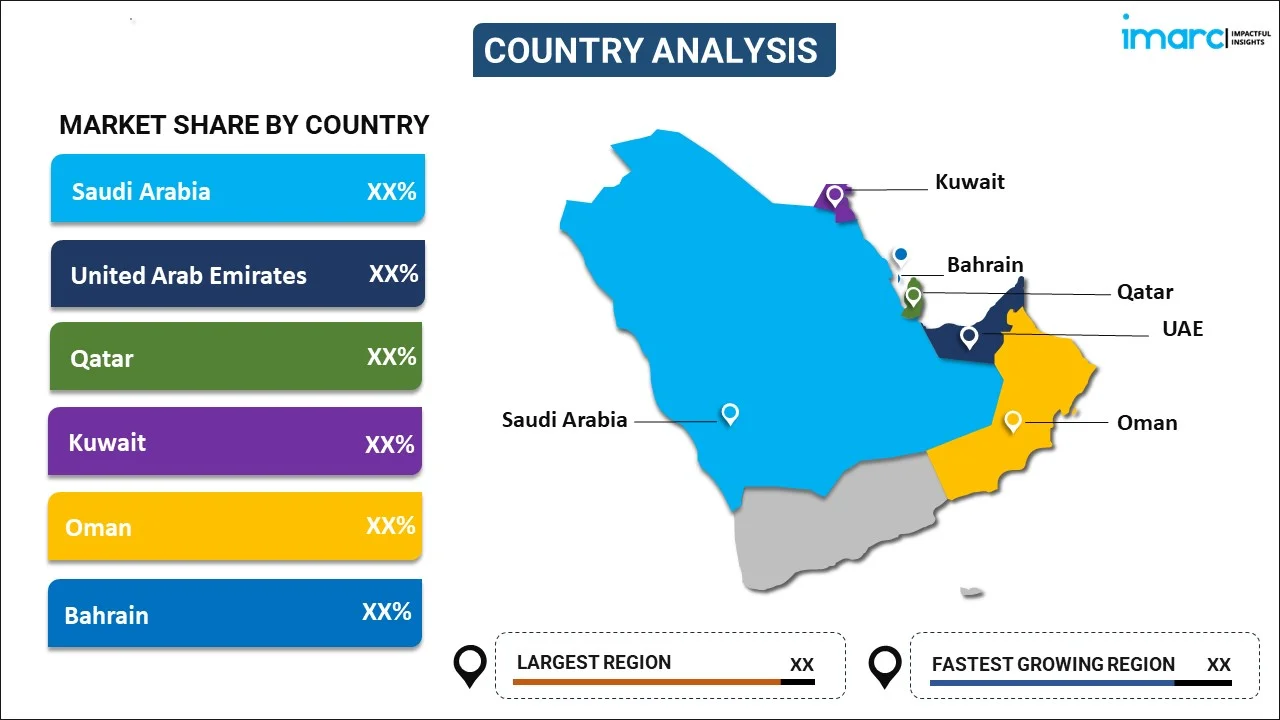
GCC Building Management System (BMS) Market Report by Service Type (Professional Services, Managed Services), Software (Facility Management, Security Management, Energy Management, Infrastructure Management, Emergency Management), Application (Residential, Commercial, Industrial), and Country 2025-2033
Market Overview:
The GCC building management system (BMS) market size reached USD 446.0 Million in 2024. Looking forward, IMARC Group expects the market to reach USD 1,321.8 Million by 2033, exhibiting a growth rate (CAGR) of 12.83% during 2025-2033. The increasing emphasis on energy efficiency and sustainable practices, rising need for efficient building operations and maintenance in residential areas, and the growing demand for remote patient monitoring (RPM) solutions represent some of the key factors driving the market.
|
Report Attribute
|
Key Statistics
|
|---|---|
|
Base Year
|
2024
|
|
Forecast Years
|
2025-2033
|
|
Historical Years
|
2019-2024
|
|
Market Size in 2024
|
USD 446.0 Million |
|
Market Forecast in 2033
|
USD 1,321.8 Million |
| Market Growth Rate 2025-2033 | 12.83% |
A building management system (BMS), also known as a building automation system (BAS), is an integrated network of hardware and software designed to monitor and control various building systems to optimize their performance, efficiency, and comfort. It works by collecting data from sensors and devices scattered throughout the building, which feeds into a central computer. It processes the information and triggers appropriate actions to maintain desired conditions. It enhances energy efficiency by allowing real time adjustments, which leads to reduced operational costs and a smaller carbon footprint. It also improves occupant comfort by maintaining optimal conditions. It can detect faults or irregularities early in the systems, which can prevent potential disasters like fires or equipment failures. It can create an ideal workspace environment by regulating lighting and temperature. BMS is utilized in large commercial, industrial, and residential structures to centrally manage systems like heating, ventilation, and air conditioning (HVAC), lighting, security, and fire alarms.
GCC Building Management System (BMS) Market Trends:
The increasing emphasis on energy efficiency and sustainable methods is encouraging the adoption of BMS to optimize energy usage in buildings across the GCC region. This, coupled with initiatives undertaken by governing authorities of numerous countries in the region to promote energy conservation, represents one of the major factors fueling the market growth. Moreover, the rising need for efficient building operations and maintenance in the residential and commercial areas is favoring the growth of the market in the region. In addition, BMS finds application in the healthcare sector to regulate temperature, humidity, and air quality in hospitals, which promotes patient well-being and safeguarding sensitive equipment. This, coupled with the growing need for remote patient monitoring (RPM) solutions due to the rising prevalence of chronic disorders among the masses, is influencing the market positively in the region. Apart from this, the establishment of transportation hubs, including airports, train stations, and bus stations, is catalyzing the demand for BMS to regulate indoor climates and create comfortable spaces for travelers in the region. Furthermore, key players operating in the region are integrating advanced technologies, such as the internet of things (IoT), artificial intelligence (AI), machine learning (ML), big data analytics, edge computing, predictive maintenance, virtual reality (VR), and augmented reality (AR) in BMS to enhance efficiency, sustainability, and occupant comfort. These advancements help learn from historical data and adapt to changing conditions, which enables more accurate predictions and automated responses and manage access control, monitor CCTV cameras, and ensure building safety.
GCC Building Management System (BMS) Market Segmentation:
IMARC Group provides an analysis of the key trends in each segment of the GCC building management system (BMS) market report, along with forecasts at the regional and country levels for 2025-2033. Our report has categorized the market based on service type, software, and application.
Service Type Insights:

- Professional Services
- Managed Services
The report has provided a detailed breakup and analysis of the market based on the service type. This includes professional services and managed services.
Software Insights:
- Facility Management
- Security Management
- Energy Management
- Infrastructure Management
- Emergency Management
A detailed breakup and analysis of the market based on the software has also been provided in the report. This includes facility management, security management, energy management, infrastructure management, and emergency management.
Application Insights:
- Residential
- Commercial
- Industrial
The report has provided a detailed breakup and analysis of the market based on the application. This includes residential, commercials, and industrial.
Country Insights:

- Saudi Arabia
- UAE
- Qatar
- Bahrain
- Kuwait
- Oman
The report has also provided a comprehensive analysis of all the major regional markets, which include Saudi Arabia, UAE, Qatar, Bahrain, Kuwait, and Oman.
Competitive Landscape:
The report has also provided a comprehensive analysis of the competitive landscape in the market. Competitive analysis such as market structure, key player positioning, top winning strategies, competitive dashboard, and company evaluation quadrant has been covered in the report. Also, detailed profiles of all major companies have been provided.
GCC Building Management System (BMS) Market Report Scope:
| Report Features | Details |
|---|---|
| Base Year of the Analysis | 2024 |
| Historical Period | 2019-2024 |
| Forecast Period | 2025-2033 |
| Units | Million USD |
| Scope of the Report | Exploration of Historical and Forecast Trends, Industry Catalysts and Challenges, Segment-Wise Historical and Predictive Market Assessment:
|
| Service Types Covered | Professional Services, Managed Services |
| Softwares Covered | Facility Management, Security Management, Energy Management, Infrastructure Management, Emergency Management |
| Applications Covered | Residential, Commercial, Industrial |
| Countries Covered | Saudi Arabia, UAE, Qatar, Bahrain, Kuwait, Oman |
| Customization Scope | 10% Free Customization |
| Post-Sale Analyst Support | 10-12 Weeks |
| Delivery Format | PDF and Excel through Email (We can also provide the editable version of the report in PPT/Word format on special request) |
Key Questions Answered in This Report:
- How has the GCC building management system (BMS) market performed so far and how will it perform in the coming years?
- What has been the impact of COVID-19 on the GCC building management system (BMS) market?
- What is the breakup of the GCC building management system (BMS) market on the basis of service type?
- What is the breakup of the GCC building management system (BMS) market on the basis of software?
- What is the breakup of the GCC building management system (BMS) market on the basis of application?
- What are the various stages in the value chain of the GCC building management system (BMS) market?
- What are the key driving factors and challenges in the GCC building management system (BMS) market?
- What is the structure of the GCC building management system (BMS) market and who are the key players?
- What is the degree of competition in the GCC building management system (BMS) market?
Key Benefits for Stakeholders:
- IMARC’s report offers a comprehensive quantitative analysis of various market segments, historical and current market trends, market forecasts, and dynamics of the GCC building management system (BMS) market from 2019-2033.
- The research study provides the latest information on the market drivers, challenges, and opportunities in the GCC building management system (BMS) market.
- Porter's five forces analysis assist stakeholders in assessing the impact of new entrants, competitive rivalry, supplier power, buyer power, and the threat of substitution. It helps stakeholders to analyze the level of competition within the GCC building management system (BMS) industry and its attractiveness.
- Competitive landscape allows stakeholders to understand their competitive environment and provides an insight into the current positions of key players in the market.
Need more help?
- Speak to our experienced analysts for insights on the current market scenarios.
- Include additional segments and countries to customize the report as per your requirement.
- Gain an unparalleled competitive advantage in your domain by understanding how to utilize the report and positively impacting your operations and revenue.
- For further assistance, please connect with our analysts.
 Request Customization
Request Customization
 Speak to an Analyst
Speak to an Analyst
 Request Brochure
Request Brochure
 Inquire Before Buying
Inquire Before Buying




.webp)




.webp)












